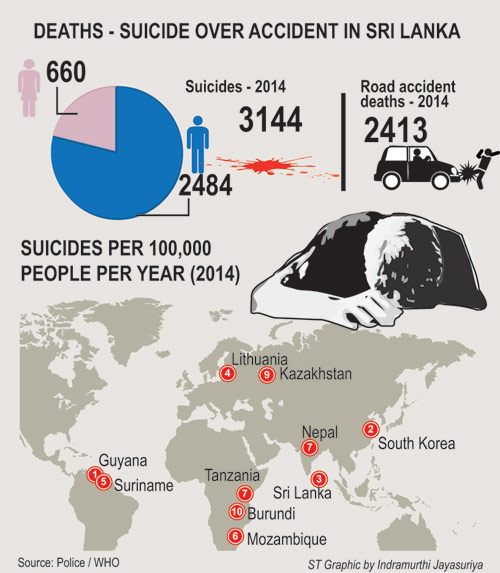News
Suicide rate drop aided by change in poison use
 Sri Lanka has made progress in bringing down the number of suicides after being a country with one of the highest suicide rates in the world in 1996 – yet every year, for the past five years, more than 3000 people have taken their lives.
Sri Lanka has made progress in bringing down the number of suicides after being a country with one of the highest suicide rates in the world in 1996 – yet every year, for the past five years, more than 3000 people have taken their lives.
Men are three times more likely to commit suicide than women in Sri Lanka, with economic burdens brought on by poverty -the main reason for deaths.
The country’s suicide rate is currently around 20 per 100,000 of the population; anything above 16 per 100,000, the global average, is considered “high” by the World Health Organisation (WHO).
“Suicide has always been, and always will be, a subject of significant complexity,” a spokesman for suicide counselling centre Sumithrayo said.
Medical experts say part of the decline in suicides is due to a change in the means of bringing about death.
“Consumption of poison and hanging were the main methods used for suicide. Now many take prescription drugs and hope to overdose and die but usually these drugs are not so lethal,” Dr. Raveen Hanwella, Head of the Psychological Studies at the Colombo University, said.
The number of those who use hanging as a method of suicide has not changed but statistics show fewer people are being admitted to hospitals for poisoning. At the same time, those using medicinal drugs have increased over the years, Dr. Hanwella said.
“It would only take a person Rs. 50 to buy medicinal drugs and attempt suicide, but it costs the state close to Rs. 50,000 to provide antibiotics to one person,” Dr. Hanwella commented.
In farming communities, where there is easy access to pesticides, poison is still the main choice.
Statistics show that around four out of 10 people who die by suicide have attempted it in the past.
Dr. Hanwella said that there is a general misconception that only those who are mentally ill feel suicidal: people who talk of committing suicide are mostly seeking attention and can be helped, he said.
“When someone has a problem that is not attended to or addressed, they depend on their coping skills,” he said. It is only when the coping mechanism fails that a person overwhelmed with feelings of helplessness and depression, become suicidal.
“When dealing with a suicidal person, one should avoid being judgmental. What they need is for someone to listen to them and understand them. We must help them see beyond their tunnel vision and help them understand that there are other solutions,” Dr. Hanwella said.
Unnecessary pressure on young children was pushing them towards depression, Dr. Rasanjali Hettiarachchi, consultant at the Ministry of Health, said.
“Even young children are pressured by their parents to perform better than other students in school. Parents pile on so many expectations on the children that sometimes when they are unable to get the results expected by their parents, the children are unable to face them and in some instances take their own lives,” Dr. Hettiarachchi said.
Sri Lanka was one of the very few countries that had policies in place to prevent suicide but these were inactive, the former head of the Institute of Mental Health, Dr. Neil Fernando, said. The policy framework submitted by a presidential taskforce in 1996, when Sri Lanka had the highest number of suicides in the world, was yet to be fully implemented.
The taskforce put forward four suggestions to decrease the number of suicides and had they been implemented then, suicides would have decreased.
One suggestion was the development of treatment facilities for survivors of suicide attempts. “Research shows that patients admitted to hospitals with Intensive Care Units have more chances of survival than others,” Dr. Fernando said.
For help, contact Sumithrayo: 011 2692909; sumithra@sumithrayo.org

